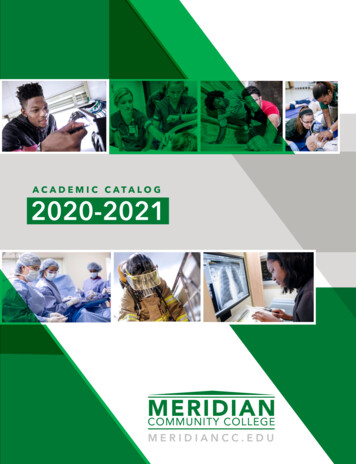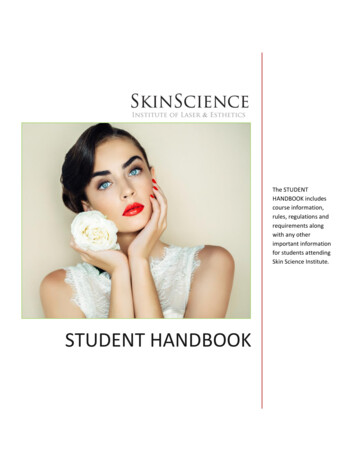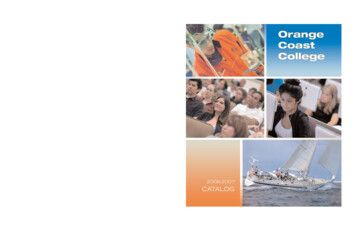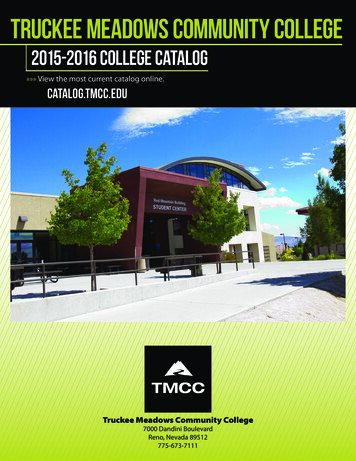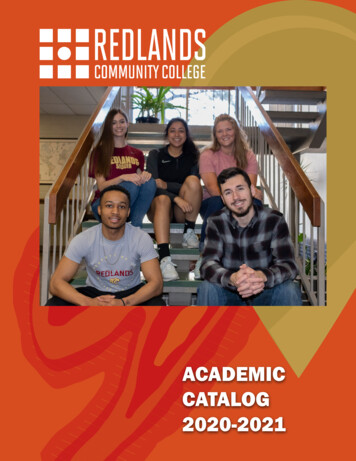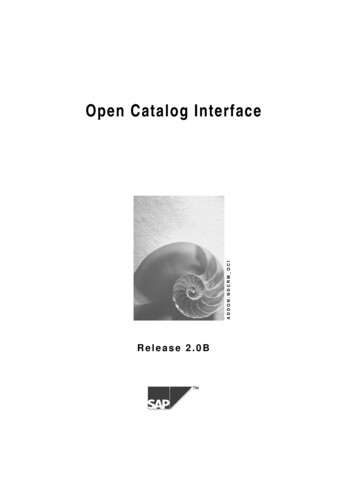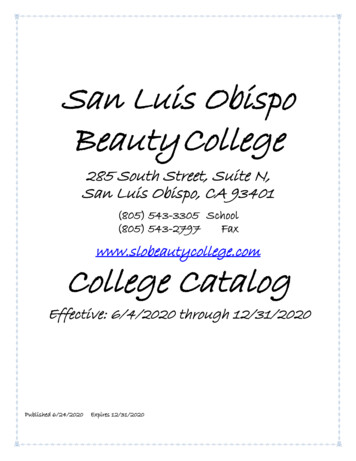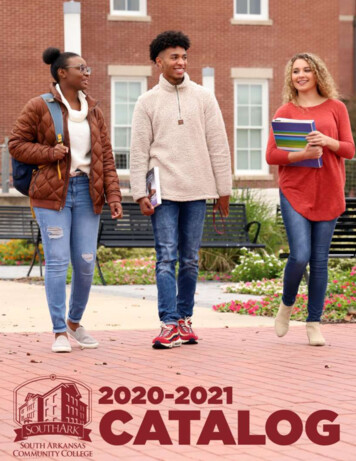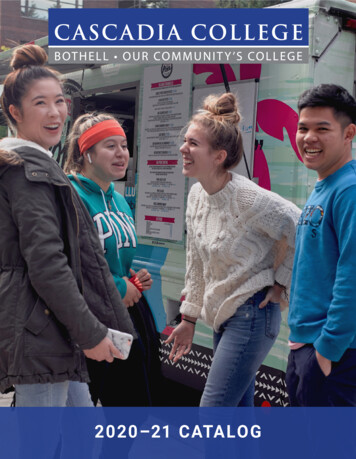
Transcription
2020–21 CATALOG
CONTENTSFROM THE PRESIDENT3BOARD OF TRUSTEESTuition, Fees, and Financial AidTUITION106General Information3TUITION CHART108VISION4TUITION AND FEE WAIVERS109MISSION4FEES110OUR THEMES4FINANCING YOUR EDUCATION111OUR VALUES4Student ResourcesACCREDITATION5LEARNING RESOURCES116EQUAL OPPORTUNITY ANTI-DISCRIMINATION5LEARNING ASSISTANCE116TITLE IXCAMPUS SERVICES117Our Learning EnvironmentEMERGENCY COLLEGE CLOSURES118118A COMPREHENSIVE COLLEGE COMMUNITY6STUDENT LIFEOUR LEARNING ENVIRONMENT6Instructional PoliciesFAQ’S6GRADUATION REQUIREMENTS119PROGRAM REQUIREMENTS7TRANSFER SERVICES120LEARNING OUTCOMES7TRANSFER OF CREDITS120EDUCATIONAL AND CAREER PATHWAYS9ACADEMIC POLICIES121LETTER GRADE DESIGNATIONS126Programs of StudyDEGREE PROGRAMS10ADVANCED PLACEMENT (AP) CREDITS CHART128CERTIFICATE PROGRAMS11ADDITIONAL PROGRAMS11INTERNATIONAL BACCALAUREATE (IB)CREDIT TABLE129BACHELOR DEGREE REQUIREMENTS12Students’ Rights and Responsibilities131ASSOCIATE DEGREE REQUIREMENTS15PROFESSIONAL TECHNICAL DEGREEREQUIREMENTSFaculty, Administration andStaff Directory13435Glossary138CERTIFICATE REQUIREMENTS45Index139COURSES BY PROGRAM REQUIREMENT52-56Credit CoursesCOURSE DESCRIPTIONS57Admission and RegistrationKODIAK CORNER/STUDENT SERVICES100APPLYING FOR ADMISSION100INTERNATIONAL STUDENTS103CAREER AND COURSE PLANNING104REGISTERING FOR CLASSES105Cascadia College18345 Campus Way NE Bothell, WA 98011425.352.8000 info@cascadia.eduwww.cascadia.eduCR E AT I NGOPPORTUNIT I ESWASHINGTON COMMUNITY AND TECHNICAL COLLEGE S
Welcome!Think critically, learn actively, interactin diverse environments, andcommunicate with clarity. Those areCascadia’s four learning outcomesdriven by our mission to be acollaborative, learner-centered college.Every class is designed to embracethose learning outcomes and exposesstudents to small group work whereprojects, presentations, and teaching others are key components. Whetheryou’re coming back to college after a break, heading to college out of highschool, or simply exploring new fields, you’ll be exposed to a truly differentkind of learning atmosphere at Cascadia.BOARD OF TRUSTEESFROM THE PRESIDENTCascadia is a young, vibrant college. Its progressive faculty helps studentslearn that all disciplines relate to each other. Students will see themesdiscussed across all classes, like global awareness, social justice, orenvironmental sustainability. Students will be taught on the newest, mostdynamic campus in the community college system. And, students willhave exposure to our partners, the University of Washington Bothell, on ourco-located campus. Cascadia has one of the highest transfer rates in thestate for these very reasons.We are committed to helping you reach your educational goals and hopeyou’ll use this catalog to help guide your way. If you’re in need of help,reach out to one of the staff or faculty. We’re here to help you succeed!Sincerely,Eric W. Murray, Ph.D.President, Cascadia College3CATALOG 2020-21Cascadia CollegeBoard of TrusteesThe college is governed by aBoard of Trustees, which isappointed by the Governor.The Board members are (top tobottom): Roy Captain, Mike Kelly,Janet McDaniel, Dr. ColleenPonto, and Dr. Meghan Quint.CASCADIA COLLEGE
G E N E R A L I N F O R M AT I O N2020-21 Academic CalendarVISIONEvery individual is supported and engaged inlifelong learning.MISSIONTransforming lives through integratededucation in a learning-centered community.OUR THEMESaccess integrated education learningcentered environment assessment ofstudent success institutional sustainabilitySummer Quarter 2020July 2Independence Day/College ClosedJuly 6First Day of Summer QuarterAug. 27Last Day of Summer QuarterFall Quarter 2020Sept. 1First Day of Pre-Fall ClassesSept. 7Labor Day/College ClosedSept. 11Sept. 18-19Sept. 28Last Day of Pre-Fall ClassesRosh HashanaFirst Day of Fall QuarterOct. 27Non-Instructional Day/No Classes/Offices ClosedNov. 11Veterans Day/College ClosedNov. 26Thanksgiving/College ClosedNov. 27Native American Heritage Day/College ClosedDec. 16Last Day of Fall QuarterWinter Quarter 2021Dec. 25Jan. 1New Year’s Day/College ClosedJan. 4First Day of Winter QuarterJan. 18Martin Luther King, Jr. Holiday/College ClosedJan. 28Non-Instructional Day/No Classes/Offices Closeda caring communityFeb. 15President’s Day/College Closeddiversity, equity & inclusionMar. 19Last Day of Winter QuarterOUR ental sustainabilityglobal awareness4Christmas Holiday/College ClosedSpring Quarter 2021Mar. 29First Day of Spring QuarterApr. 27Non-Instructional Day/No Classes/Offices ClosedMay 12Non-Instructional Day/No Classes/Offices ClosedresponsivenessMay 31Memorial Day/College ClosedJune 11Last Day of Spring QuartercreativityJune 11CommencementCATALOG 2020-21CASCADIA COLLEGE
G E N E R A L I N F O R M AT I O NACCREDITATIONCommission on Colleges and Universities indicates that itmeets or exceeds criteria for the assessment of institutionalquality evaluated through a peer review process. An accreditedcollege or university is one which has available the necessaryresources to achieve its stated purpose through appropriateeducational programs, is substantially doing so, and givesreasonable evidence that it will continue to do so in theforeseeable future. Institutional integrity is also addressedthrough accreditation.Accreditation by the Northwest Commission on Colleges andUniversities is not partial but applies to the institution as awhole. As such, it is not a guarantee of every course orprogram offered, or the competence of individual graduates.Rather, it provides reasonable assurance about the quality ofopportunities available to students who attend the institution.Inquiries regarding an institution’s accreditation status by theNorthwest Commission on Colleges and Universities shouldbe directed to the administrative staff of the institution.Individuals may also contact:Northwest Commission on Colleges and Universities8060 165th Avenue N.E., Suite 100Redmond, WA 98052425.558.4224www.nwccu.orgAccreditation by the Northwest Commission on Colleges andUniversities refers to the institution as a whole. Therefore,statements like “fully accredited” or “this program is accreditedby the Northwest Commission on Colleges and Universities” or“this degree is accredited by the Northwest Commission onColleges and Universities” are incorrect and should not be used.EQUAL OPPORTUNITYANTI-DISCRIMINATIONCascadia is committed to creating a supportive environmentfor a diverse student, faculty, and staff population. Individualdifferences are celebrated in a pluralistic community oflearners. Cascadia does not discriminate on the basis of race,color, religion, gender and/or sex, sexual orientation, nationalorigin, citizenship status, age, marital or veteran status, orthe presence of any sensory, mental or physical disability,or genetic information, and is prohibited from discriminationin such a manner by college policy and state and federal law.The following office has been designated to handle inquiriesregarding non-discrimination policies and can direct inquiriesto the appropriate office for ADA-related requests:Vice President of Administrative Servicesand Human ResourcesCascadia College18345 Campus Way NE, CC2-280Bothell, WA 98011425.352.8262TITLE IXTitle IX of the education Amendments of 1972 prohibitsdiscrimination on the basis of sex in education programsor activities that receive Federal financial assistance.In compliance with Title IX, Cascadia is committed to providingan educational environment free from sexual harassment,including acts of sexual violence or sexual assault.The College is equally committed to ensuring that those whoraise complaints or participate in the investigation andresolution of complaints are free from retaliation. To raise acomplaint or voice a concern with Cascadia’s compliance withTitle IX, contact:Vice President of Administrative Servicesand Human ResourcesCascadia College18345 Campus Way N.E., CC2-280Bothell, WA 98011425.352.82625CATALOG 2020-21CASCADIA COLLEGE
OUR LEARNING ENVIRONMENTA COMPREHENSIVE COLLEGECOMMUNITYFAQ’SCascadia is a public community college that offers two-yeardegrees for transfer to universities, two Bachelor of AppliedScience (one in Sustainable Practices and one in MobileApplication Development), certificate programs, adult basiceducation, High School , ESL for adults, and a broad range ofnon-credit courses and professional training. The college alsoconducts business-specific customized contract educationand skill-training.What degrees and certificates are offered?10-11What courses are available?57-99Cascadia is located along Beardslee Boulevard in Bothell,Washington at the intersection of I-405 and SR-522.Co-located with the University of Washington Bothell, thecampus location was planned to serve the fast-growing areaof northeast King and south Snohomish Counties. Fifty-eightacres on the campus are under long-term restoration to highfunctioning wetlands. A paved trail with educational signageborders the wetlands and is open to the public. The campusdesign has won the highest prize awarded by the AmericanInstitute of Architects for “drawing together the learningcommunity and protecting their communal experience whileretaining its connection to the world outside.”Cascadia’s legislatively assigned service district includes thecities of Bothell, Woodinville, Kirkland, Kenmore, Duvall, Carnation,Sammamish, Redmond, and many smaller communities.4How do I apply to Cascadia College?100How do I transfer credits from another college?120Can high school students attend Cascadia?101How do I decide which classes to take?104How can I make an advising appointment?104Where can I find job information?104How do I register for classes?105How much does it cost to take classes?106-109Is help available to pay for tuition?111-115How do I graduate?119OUR LEARNING ENVIRONMENTCascadia has offered students an integrated education since We opened our doors in 2000. We invite students to connectdisciplinary and interdisciplinary ideas to complex contexts, build knowledge across the curriculum and co-curriculum, and applythis education to situations on and off campus. Simply put, Cascadia’s teaching and learning model recognizes that a qualitycollege education goes far beyond the boundaries of the traditional curriculum and classroom boundaries.These are some of the academic opportunities you can look forward to as a student at Cascadia:Interdisciplinary ProjectsDisciplines such as math, history, and science are rarelydiscrete in the real world. The types of problems thatemployees in today’s workforce are tasked with solving areusually best approached by connecting skills and contexts.Cascadia instructors design assignments that allowstudents from different disciplines to work collaboratively.For instance, information technology students have workedwith art students to produce an installation that combinedprogrammed light sequences with illustrations. Historystudents have worked with English students to researchstate songs and then update them to reflect moreappropriately the era in which we live.Learning CommunitiesA learning community is 10-credit course that pairs twoinstructors from two different disciplines to team-teach ablended class. For instance, a course might combine 5credits of English and 5 credits of Geology and exploreenvironmental issues through reading, writing, and thesciences. Learning communities generally provoke richdiscussions and encourage students to delve much deeperinto topics by synthesizing knowledge, identifying patterns,and making connections.6When is spring break?CATALOG 2020-21Community-Based Learning, Internships,and Study AbroadExperiential learning opportunities allow students to take whatthey have learned in the classroom and apply it to real-lifesituations. Some students might be involved in a communitypoetry reading, while others will find themselves assisting middleschool students with math concepts or practicing a new languagein a study abroad program.Group WorkThroughout Cascadia, you’ll find classes that require you to workin small groups. Group assignments are designed to help you learnto communicate, solve problems, make decisions, and interactwith a diversity of people and viewpoints. Employers across allindustries agree such skills are critical in today’s complex,interdependent, and increasingly international workplace.CASCADIA COLLEGE
OUR LEARNING ENVIRONMENTPROGRAM REQUIREMENTSThe General Education CoreGeneral education is the cornerstone of every degree program at Cascadia. In general education courses, students acquire a setof skills that will enable them to access, process, construct, and express knowledge across cultures. Completing the generaleducation core at Cascadia requires a willingness to take risks, an interest in growing and adopting new, more refined points ofview, and an awareness of a global context for ideas and facts. General education classes lay the ground work for active, life-longlearning and prepare students for future challenges through learning experiences in which they encounter and master their ownknowledge and practices that foster their growth.Foundations for College SuccessCollege Success introduces students to Cascadia’s learningmodel, helps them to take ownership of their education andsets them up for academic success. In College 101, eachstudent participates in a group project, completes a guidedresearch project in the university library, writes a tentativeeducational plan, and practices using a course website tocomplete assignments and interacts with an instructorand other students. All Cascadia students who completeFoundations for College Success have a minimum of 35credits of guided practice in achieving the following outcomes.Learn: Learners will demonstrate that they can find and usea variety of academic resources (including eLearning andlibrary resources) at Cascadia. They will demonstrateownership of their education and develop an academic plan.Think: Learners will demonstrate basic information literacyskills and knowledge of particular ways of knowing andreasoning in the different academic disciplines.Communicate: Learners will demonstrate flexibility inrecognizing and expressing concepts in appropriate formatsand they will be able to explain how they arrived at theirconclusions.Interact: Learners will demonstrate the ability to effectivelycollaborate in group activities.CommunicationEvery degree at Cascadia is grounded in a set of core coursesthat emphasize communicating and critical thinking. In thecomposition sequence of the General Education CoreDistribution, learners have a chance to become aware of theways that culture informs, enriches, and at times limits learningand growth. Students practice argument, problem solving,analysis, and synthesis while they encounter and try out pointsof view from across the globe and reflect on their own points ofview. All Cascadia students who complete the compositionsequence have a minimum of 10 credits of guided practice inachieving the following outcomes.Learn: Learners will become familiar with writing and readingprocesses and develop a personal process that helps themcreate successful texts; demonstrate a willingness to take risksand to deepen knowledge about self, others, and the world as itrelates to writing and its process; learn to construct meaningfrom expanding and conflicting information; and meet deadlinesand seek help when necessary.7LEARNING OUTCOMESCATALOG 2020-21Think: Learners will use a variety of conceptual and theoreticallenses and reflect on how these lenses provide alternative viewsof the experience and points of view of self, individuals, andgroups; critically reflect on their own attitudes, values, behavior,and assumptions as well as those presented to them; andtranslate content between contexts with an awareness of theimpact of different points of view and mediums.Communicate: Learners will gather information and draft andpublish texts that demonstrate inquiry into critical and creativethinking and an awareness of criteria for clear, originalcommunication; communicate interpretations of data andclaims and articulate rationales for making decisions aboutresponsible action in the context of community issues andproblems; and use technology and methods of discourse aslearning tools.Interact: Learners will share ideas, experiences, and selfassessment processes and listen to those of others; engage incollaborative peer review processes that will reflect theirunderstanding of their experiences, composition practice, andself-assessment; and recognize conflict as a necessary part ofdiscourse and respect individual ways of arriving at answerswhile critically analyzing models and ways of thinking.CASCADIA COLLEGE
OUR LEARNING ENVIRONMENTPROGRAM REQUIREMENTS (CONTINUED)Quantitative or Symbolic ReasoningEquity, Diversity, and PowerThe ability to quantitatively and symbolically reason is criticalin an ever-increasing complex society. In turn, the GeneralEducation Core provides students practice in problem solvingand critical thinking using multiple approaches to drawconclusions while communicating their results and interactingwith others. All Cascadia students who complete Quantitativeor Symbolic Reasoning have a minimum of 5 credits of guidedpractice in achieving the following outcomes.Cascadia College stands for diversity, equity, inclusion,and responsiveness.Learn: Learners will apply problem solving and mathematicalmodeling to real situations and take responsibility for accessingand using a variety of sources in learning about mathematics.Think: Learners will analyze and interpret data or evidence tocorrectly solve problems through the construction of clear,well-supported arguments that lead to valid conclusionssupported by appropriate symbolic reasoning andmathematical models.Communicate: Learners will interpret complex problems andillustrate solutions using mathematical symbols and formulasthat justify mathematical conclusions expressed in written ororal form.Interact: Learners will engage with complex differencesbetween and among their own cultures and others asmanifested through social inequities. As part of this practice,students will recognize and articulate their understanding ofdiverse perspectives.The EDP requirement is intended to help students begindeveloping skills and knowledge to successfully navigate livingin an increasingly interconnected, complex, and diverse world.The 150-series requirement grounds students in the neededcognitive tools and background to critically analyze theirevolving positions in society so they can pursue further studyand seek out their careers more intentionally. In fulfilling theEDP requirement, students learn how local and global systemsof power, privilege, and inequality are created and maintained.Additionally, students learn how individuals, communities, andsocieties/cultures are impacted by these systems and explorestrategies for equitable change.Learn: Students acquire and construct knowledge regardinglocal and global systems of power, privilege, inequality, andcultural diversity.Think: Students use varied approaches to think critically aboutand reflect on both their personal views and assumptions, aswell as other viewpoints, related to power, privilege, inequality,and cultural diversity.Communicate: Students discuss course content as it relates topower, privilege, inequality, and cultural diversityInteract: Students engage with complex differences within andbetween their own and other cultures in relation to power,privilege, inequality, and cultural diversity.HumanitiesLanguages, literature, the arts, and philosophy are essential cultural expressions of being human. Underlying these subjects areideas such as aesthetics, ethics, symbolism, and creativity that vary across times and cultures. Through the humanities, learnersparticipate in others’ subjective experience of reality and convey their own.Learn: Learners will acquire, create, demonstrate, and apply knowledge by investigating and synthesizing ideas, themes andprocesses within and related to Humanities disciplines to realize themselves as imaginative risk-takers, problem-solvers, globalcitizens and autonomous life-long learners.Think: Learners will refine knowledge through analysis, evaluation, experimentation, and innovation, working with ideas andartifacts that already exist and bringing new ideas and artifacts into existence to enrich our understanding of humanity.Communicate: Learners will consider their own and others’ perspectives and contexts, recognize formal and informalconventions of disciplines, genres, and cultures, seek original thoughts, and articulate knowledge via their own messages.Interact: Learners will respectfully engage viewpoints, interpretations, and sources that embody global diversity, creating acommunity of inquiry that values ambiguity to expand our collective knowledge of the human experiencein all its forms.8CATALOG 2020-21CASCADIA COLLEGE
OUR LEARNING ENVIRONMENTPROGRAM REQUIREMENTS (CONTINUED)Natural SciencesSocial SciencesScience literacy provides a foundation for informed citizenshipin our increasingly technological society. Learners practice,communicate, and apply science in order to understand thenatural and physical world and the consequences of humanactivity within it.The social sciences expand learners’ understanding of thenature and behavior of individuals as well as their interactionand organization in multiple cultural contexts.Learn: Learners will employ scientific approaches to explainnatural phenomena; they will generate knowledge by makingand assessing controlled observations, formulating testablepredictions, and evaluating verifiable data.Think: Learners will use components of the scientific methodto generate and modify hypotheses through critical analysis ofdata and information; they will evaluate known and neededinformation as a process in problem-solving; they will assessand respond to current global issues in the context ofevidence-based conclusions.Communicate: Learners will articulate scientific conceptsclearly and correctly through a variety of media (oral, written,visual, and graphical); learners will concisely organize andpresent evidence and data; learners will actively listen andrespond to communication with peers and instructors in arespectful manner.Interact: Learners will work responsibly and effectivelyin groups to accomplish tasks, analyze data, and solveproblems; they will engage with their peers to use multipleperspectives to explain scientific applications; they willconnect learning and their interactions with the naturalworld; they will evaluate the global, environmental, andhuman contexts of scientific concepts.Learn: Learners will engage in experiential activities to acquire,construct, demonstrate and apply social scientific knowledgein a variety of contexts; they will complete required work andidentify opportunities to expand knowledge, skills, and abilities.Think: Learners will acknowledge the complexities of specificsocial issues and analyze underlying assumptions and multipleperspectives on those issues. They will identify and evaluateevidence to draw conclusions about human behavior; they willdistinguish between social scientific and other ways ofknowing; and they will combine or synthesize course materialin original and exploratory ways to apply that information tohypothetical or real world situations.Communicate: Learners will use oral and writtencommunication to raise and explore important questions inthe social sciences; learners will use disciplinary knowledge,texts, technology, and language to gather, process, present,and reference information.Interact: Learners will demonstrate the ability to workcollaboratively in groups and translate those skills tointeractions with others; they will identify ways in whichdisciplinary, ethical, and professional standards shape socialscientists’ interactions with society; they will identify andreflect on differences between individuals, groups,communities, or societies and how those differences shapeinteractions, perspectives, and outcomes.EDUCATIONAL AND CAREER PATHWAYSCascadia Offers a Variety of Degrees and Certificates for StudentsWhat program is right for me? A student who wants to get a Bachelor of Arts Degree shouldstart with an Associate in Integrated Studies (AIS) Degree. A student who wants to get a Bachelor of Arts or Science inBusiness should start with an Associate in Business Degree. A student who wants to earn a Bachelor of Science Degreeshould consult with an academic advisor to decide ifobtaining an Associate in Science Degree in either Track 1or Track 2, Associate in Biology, or Associate in IntegratedStudies is the best option. A student wishing to concentrate on skills leading directly toemployment but with some transfer options should consideran AAS -T degree. A student wishing to concentrate on skills leading directly toemployment while also earning a bachelor’s degree shouldconsider a Bachelor of Applied Science degree. The Bachelorof Applied Science degree is also an appropriate pathway tosome master and doctoral degrees. Cascadia College uses Meta Majors as a tool to helpstudents align their interests, skills, and experienceswith a career in order to select an educational program.Meta Majors are used during the Cascadia Orientationand Registration Experience (CORE) to help newstudents enroll in first-quarter classes aligned with theircareer and academic goals.Cascadia’s Meta Majors are: Communication, Creative Arts, and Design Social Sciences, Human Services, and Education Business Health and Wellness Science, Technology, Engineering, Math Sustainability and Environmental Studies A student wishing to prepare for work in the shortest timepossible should consider a certificate.9CATALOG 2020-21CASCADIA COLLEGE
P R O G R A M S O F S T U DYDEGREE PROGRAMSAcademic Transfer DegreesAn associate degree prepares you for employment or fortransfer to a 4-year college. To receive an associate degreeyou must complete 90-105 credits (2 years of full-time study),complete at least 25 of your degree credits at Cascadia,and receive a grade point average (GPA) of at least 2.0 in allcourses that apply to your degree, including courses atother colleges.If you plan to apply for transfer to a 4-year college, contact theadmissions office and an academic advisor in your chosenmajor at that college to confirm admission requirements. Youdo not need to complete a degree at Cascadia to be eligible totransfer to a 4-year college. Your transfer will be simplified ifyou complete a degree with a DTA or MRP.Professional Technical Transfer Degrees:Associate in Applied ScienceAn associate in applied science (AAS-T) degree is designed toprepare you for employment in a specific field and has limitedtransferability. An AAS-T contains a minimum of 20 credits ofgenerally transferable academic sore courses.An AAS-T typically transfers to applied baccalaureate degreesor by an articulation to a specific university.All AAS-T degrees require you to complete 90-98 credits,or 2 years of full-time study.Five degrees are available: ETSP - Environmental Technologies and SustainablePractices HSEM - Homeland Security/Emergency ManagementDegrees which have the DTA (Direct Transfer Agreement)indicator are designed to allow you to transfer degree creditsto most public 4-year colleges in Washington. Degrees whichhave the MRP (Major-Related Programs) take the DTA onestep further by specifying the prerequisite coursework thatwill provide the best preparation for entry into certaincompetitive majors. NIT - Networking Infrastructure TechnologyFor complete information on degree requirements, please seethe degree listings on the website.Complete Your Bachelor’s Degree at Cascadia Associate in Biology (DTA/MRP) Associate in Business (DTA/MRP) Associate in Integrated Studies (DTA) Associate in Integrated Studies - Global Studies Emphasis Associate in Pre-Nursing (DTA/MRP) Associate in Science-Transfer Track 1 Associate in Science-Transfer Track 2 AS-T Track 2 Engineering MRP– Bioengineeringand Chemical Engineering AS-T Track 2 Engineering MRP– Computerand Electrical Engineering AS-T Track 2 Engineering MRP– Mechanical, Civil,Aeronautical, Industrial and Material Science Engineering Web Applications Programming TechnologyProgramming Emphasis Web Applications Programming Technology Web EmphasisBachelor of Applied Science DegreeStudents can build upon their already valuable two-yeardegrees by completing their Bachelor of Applied Science righthere at Cascadia. The Bachelor of Applied Science (BAS) is abaccalaureate degree with a major in a technical field that hassubstantial applied content. Applied bachelor’s degreesarguably offer the best of both worlds: hands-on careertraining embedded in a two year stackable degree. Employersseek Cascadia graduates because they have technicalexpertise combined with communication, computation, criticalthinking and people-management skills.The Bachelor of Applied Science Degree in SustainablePractices is intentionally designed to prepare students assustainability professionals who can build resilience andimplement meaningful change in response to complexenvironmental, economic and social problems. The BAS inSustainable Practices is intended for students who havecompleted an associate degree in a related subject or meet thedistribution requirements through prior college coursework. Itis designed as a full-time program to be completed in sixquarters. A small cohort of students will work closely withfaculty and a dedicated program advisor to complete 90credits of upper division coursework. Courses are generallyscheduled Monday - Thursday in the late afternoon or earlyevening. For more information check the BAS in SustainablePractices website or contact the progr
a comprehensive college community 6 our learning environment 6 faq's 6 program requirements 7 learning outcomes 7 educational and career pathways 9 degree programs 10 . tuition, fees, and financial aid tuition 106 tuition chart 108 tuition and fee waivers 109 fees 110 financing your education 111 student resources

![Bosch ESI[truck] Heavy Duty Truck Software Update – Q2 .](/img/22/bosch-esitruck-heavy-duty-truck-release-notes-details-2019-2-0-0-0.jpg)

